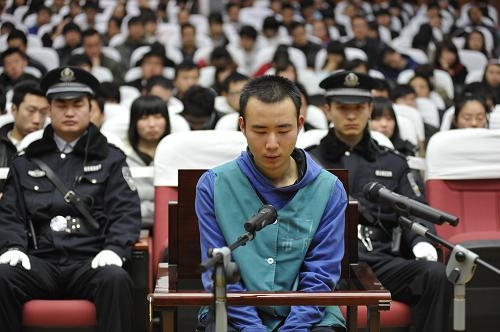Commentary from This Week's Paper

The "Passion" of Yao Jiaxin
By Qi Yue (啟越), an EO columnist
Nation, page 16
Issue 512, March 28, 2011
Original: [Chinese]
College Student Yao Jiaxin stabbed a woman six times after running her over with his car. But according to his lawyer, Yao is a model student with a spotless record who simply committed a "crime of passion."
As anyone who is remotely acquainted with the law knows, a "crime of passion" proceeds from an emotion or impulse, usually provoked by something the victim did. The only thing the 26-year-old mother Yao stabbed to death did was to look at his license plate.
If this is a crime of passion, then the lesson to be learned is don't look at the license plate if you've been hit by a car because the driver will get out of the car and kill you.
It is possible that Yao has had a strict, psychologically damaging upbringing by a tiger mother (or father). Many Chinese children have. Most do not become killers.
Yao is not the first to commit this type of crime. In Chengdu in 2006, a boy was repeatedly run over by a Mercedes until he died. In Jiangsu in September 2010, after hitting and injuring a child on the road, a BMW driver purposely crushed the child to death with his car.
The thinking behind these crimes is simple. In Beijing, the maximum amount of compensation that should be paid to the family of a victim of vehicular manslaughter is about 400,000 yuan. But if the victim is injured and sues in court, compensation can easily top 1 million yuan.
It's not a crime of passion, it's a game of numbers.
 Baidu Kowtows Only to "The Strong"
Baidu Kowtows Only to "The Strong"
By Kong Ergou (孔二狗), a popular online author who rose to prominence after publishing a series of novels called The Old Days in the Northeast: A Twenty-year Chronicle of the Mafia (東北往事:黑道風云二十年) on Tianya.cn.
Economic Observer Online
March 31, 2011
Original: [Chinese]
Baidu issued a "Letter of Apology" after popular author Han Han publically criticized the company for its stance on copyright infringement.
According to the letter, Baidu will remove all content that violates existing copyrights at the urging of "important persons."
Needless to say, the works of writers protected by large publishers will be removed. But what about the works of lesser-known authors, authors who have less leverage, who cannot force Baidu to remove their content?
Baidu also apologizes for "hurting the feelings" of writers. But what about their interests?
Baidu has no respect for literary copyright. They are happy to infringe upon authors' rights until they are challenged by a formidable opponent. Even then, they concede only to famous authors. The rights of lesser-known authors and aspiring writers continue to be neglected.
By Song Yao (宋堯), a journalist with the EO
Economic Observer Online
March 30, 2011
Original: [Chinese]
On March 29, Beijing announced a target growth rate for the city's housing prices over the coming year and with one very simple sentence "stable or a decline," they may have changed the way that most ordinary people viewed the outlook for property prices.
It's funny how the swings and roundabouts of the property market work, only yesterday, most cities around the country were locking in growth targets that were approaching annual growth of 15%.
As far as i'm concerned, these targets are so meaningless that there's no need to adjust them.
For one thing, if you're attempting to control housing prices, wouldn't it make more sense to set a target growth rate and then introduce policies aimed at meeting that target - rather than the other way around?
The raft of policies have already been put in place and this act of setting official targets is an empty gesture that allows local governments to inidcate their resolve and also helps to calm public disquiet.
But no one wants to see housing prices fall as sharply as they did in 2008, especially not local governments reliant on land sales for a large proportion of their revenues.
It's quite possible that after the latest manouveres and as these targets for growth switch from unreasonably high to the opposite extreme, a policy that was initially introduced as window dressing might just lead to having unintended negative consequences.
The views posted here belong to the commentor, and are not representative of the Economic Observer |
Popular

- Japan Earthquake:To Stay or to Go?
- Tourists are leaving, and the trend spread to longer-term residents of the country.
Interactive
Multimedia

- EEO.COM.CN The Economic Observer Online
- Bldg 7A, Xinghua Dongli, Dongcheng District
- Beijing 100013
- Phone: +86 (10) 6420 9024
- Copyright The Economic Observer Online 2001-2011
















